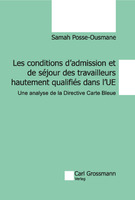Les conditions d’admission et de séjour des travailleurs hautement qualifiés dans l’UE - Une analyse de la Directive Carte Bleue
Abstract
This work focuses on the Blue Card Directive, not as a specific instrument, but as an integral part of the EU Immigration Policy Framework. Such an approach is necessary, given the sector-based approach and the legislative patchwork adopted by the EU in the field of Immigration Policy. Moreover, EU law on migration is a new but a very dynamic field which is constantly evolving. Therefore, the project not only analyses the key definitions, central themes and legal issues of the Directive but also examines its interaction and tries to establish some connections with the other EU instruments on legal migration into the EU, most of them adopted on the so-called sector-based approach (Single Permit Directive, Family Reunification Directive, Long-term Residents Directive, Researchers, Students and Others Directive, etc.). In particular, the project tries do draw a parallel between some of the Blue Card Directive provisions and the jurisprudence of the European Court delivered for similar notions or legal problems contained in the others instruments. Furthermore, the work addresses other specific issues such us : mobility, the problem of an “ethical recruitment” of highly skilled workers, the volumes of admission (to be set by the Member States), the maintaining of national schemes for highly qualified migrants besides the EU Blue Card and the integration of migrants already admitted in the Member States. L’auteure analyse le dispositif mis en place par la Directive Carte bleue, non pas en tant que système à part entière, mais comme partie intégrante de la politique européenne en matière d’immigration. Bien que relativement jeune, lors de cette dernière décennie, le droit européen de la migration est rapidement devenu un domaine très dynamique en constante évolution, caractérisé par une approche fragmentaire. Cette évolution a, entre autres, reçu une nouvelle impulsion avec l’entrée en vigueur du Traité de Lisbonne en 2009 et le passage à la procédure de codécision. Étudier le dispositif de la carte bleue comme une des pièces maîtresses du rouage de la politique européenne en matière de migration légale s’avère nécessaire compte tenu de l’approche sectorielle adoptée par l’UE dans ce domaine et la fragmentation juridique qu’elle occasionne. Dans ce cadre, ce travail s’intéresse non seulement à l’analyse des éléments essentiels et aux problèmes juridiques de la Directive Carte bleue, tels que la mobilité, le problème du recrutement éthique des travailleurs hautement qualifiés, les volumes d’admission, le maintien des systèmes nationaux parallèles pour les travailleurs hautement qualifiés aux côtés du système de la carte bleue ainsi que l’intégration des ressortissants des États tiers déjà admis sur le territoire des États membres, mais examine également les interactions et les liens du système avec d’autres instruments adoptés dans le cadre de la migration légale. En particulier, des parallèles sont établis entre l’interprétation de certaines dispositions de la Directive Carte bleue et la jurisprudence de la CJUE rendue sur la base de dispositions similaires prévues dans d’autres instruments.
Keywords
law; european policy on legal migration; european law; highly skilled workers; intégration; droit de l'ue; integration; droit; travailleurs hautement qualifiés; droit des étrangers; droit européen; eu law; politique européenne en matière de migration légale; migration légale; foreigners' rights; legal migrationDOI
10.24921/2017.94115913ISBN
9783941159129OCN
1030819578Publisher
Carl Grossmann VerlagPublisher website
http://www.carlgrossmann.com/Publication date and place
Berlin; Bern, 2017Classification
Law
International law
Public international law: human rights
Public international law: responsibility of states and other entities


 Download
Download Web Shop
Web Shop